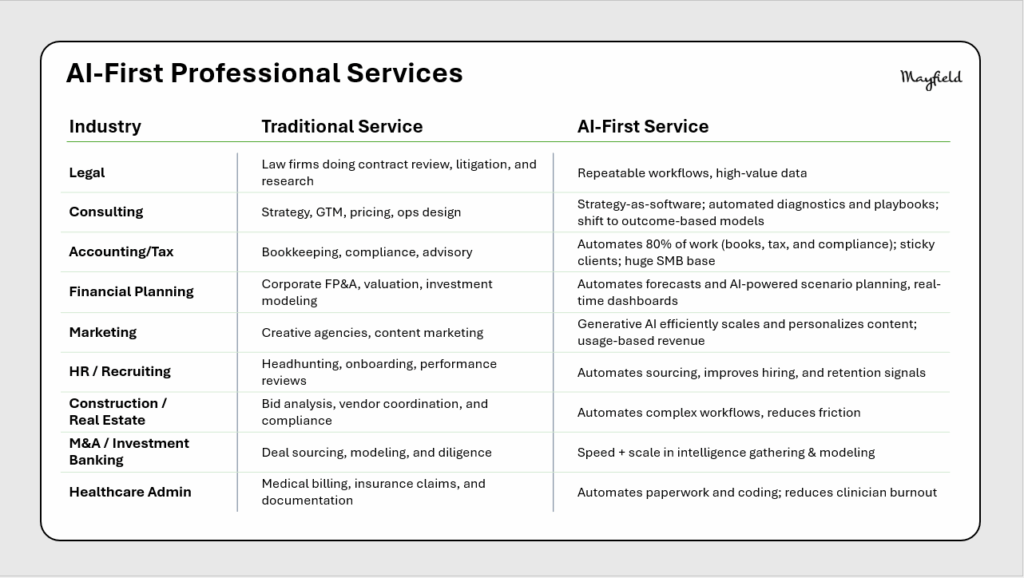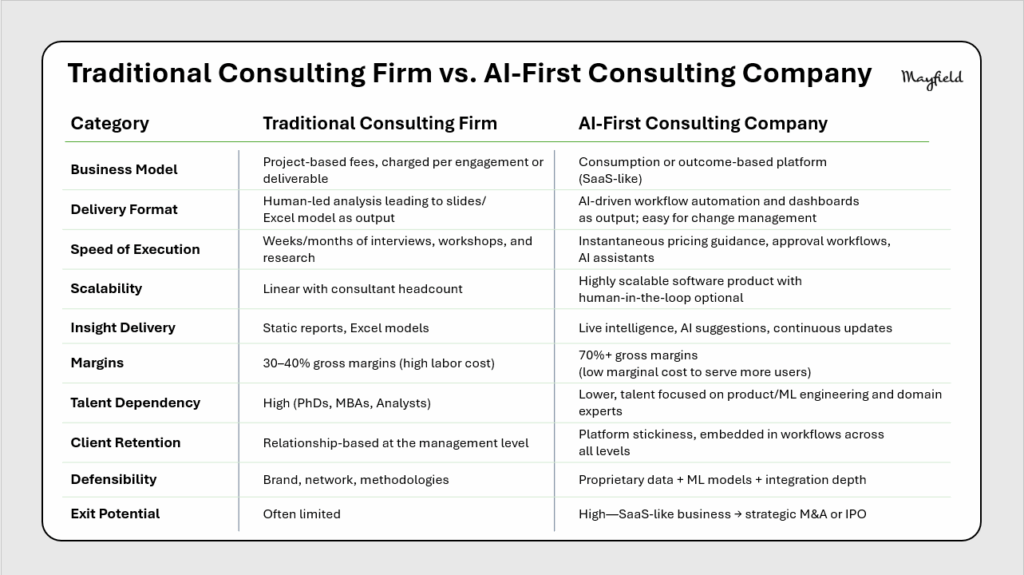


Just as the internet sparked the “e-business” revolution decades ago, we’re now entering a similar inflection point with the rise of “AI-First” Professional Services in the era of Collaborative Intelligence. Every company, whether in the legal, consulting, accounting, marketing, HR, real estate, or IT services sector, must reimagine itself as if starting today with AI at its core.
“AI-first” professional services companies are those that build their core service delivery model around AI technologies, rather than merely using AI as a tool to enhance existing workflows. These firms reimagine service delivery from the ground up with automation, machine learning, and generative AI as foundational elements.
The most exciting part?
Knowledge is being democratized. Expertise is being democratized. Traditional service businesses have built empires on controlling access to specialized knowledge. For example:
This creates a rare opportunity for entrepreneurs to reimagine entire industries from the ground up. For example, the $1.5 trillion IT services industry (per Gartner estimates for 2024) has traditionally charged by the hour, by the project, or by the month. IT services companies worth billions could be powered by AI Teammates, charging only for outcomes rather than hours or contractors.
This isn’t just disruption—it’s a great equalizer.
Need proof? Take a look at what Gruve (full disclosure: Gruve is a Mayfield portfolio company) is doing to the IT services industry right now.
They’re delivering outcome-based AI for enterprise services at scale using AI Teammates. Their mission is to transform how enterprises implement and integrate AI. While traditional IT consulting firms typically operate on gross margins of 30-40%, Gruve is targeting software-like gross margins of 70-80%.
Their AI Teammates handle routine coding tasks, documentation, and testing, allowing their human consultants to focus on high-level strategy and client relationships. Instead of billing for hours spent or contractors deployed, Gruve only monetizes when outcomes are delivered. They also reduce the time to results and help achieve the desired outcomes quickly.
This isn’t a minor change—it’s a complete reinvention of how IT services are delivered and priced.
Let’s be clear: this isn’t a niche trend. The professional services sector – spanning legal, consulting, accounting, marketing, HR, IT, and more represents a $5+ trillion global market. These are industries that have long relied on human expertise, high-touch delivery models, and premium pricing. Let’s examine the markets ripe for AI-first reinvention.
Examples of AI-First Professional Services

These companies share a common playbook, but to understand the transformation, let’s zoom in on one industry: the $362 billion consulting market (per Gartner estimates in 2024).
Traditional Consulting Firm vs. AI-First Consulting Company

Want to know why investors should be paying attention? AI-first professional services companies are completely rethinking the traditional services playbook. They’re turning labor-intensive businesses into something that looks and scales like software.
The services market is getting software-like margins. Traditional consulting firms are stuck at 30-40% margins because they scale one consultant at a time. But AI-First firms? They’re hitting 70-80% margins by automating workflows and productizing services. You’re getting SaaS economics in trillion-dollar service markets.
The markets are massive and ripe for disruption. We’re talking about law, accounting, consulting, construction, finance, and healthcare—trillion-dollar industries still running on manual processes and armies of people. Every vertical is ready to be “unbundled” by AI-First startups.
Recurring, productized revenue models. Many AI-first services evolve from one-off projects into subscription-based or usage-based pricing models, resembling SaaS business models.
Proprietary data and defensibility = real moats. As these companies process contracts, analyze bids, and handle transactions, they accumulate proprietary datasets that enhance their AI models over time. That’s defensibility you can’t easily replicate.
Clients get superpowers, not just savings. AI enables delivery at a lower cost, with faster speed and higher consistency, without compromising quality, compared to traditional human services. But the real magic? Instant legal review, real-time financial diagnostics, and a quicker feedback loop of strategic insights that keep getting smarter.
Platform expansion potential. Most AI-first companies start narrow—maybe just contract review. But once they’re embedded in a client’s workflow, they can expand to handle the entire M&A process. Before you know it, they’re not just providing the service—they’re also offering the CRM, billing, and compliance tools. It’s vertical SaaS expansion at its finest.
We’re moving from:
The pattern is clear: AI enables radically different operating models with:
When the barriers of specialized knowledge fall, the playing field levels for everyone. This isn’t just another technology cycle with incremental improvements. This technology enables humans to become superhuman, without requiring massive capital.
A small team with the right AI tools can now deliver what once required hundreds of specialists. Think big. Because the great AI equalizer isn’t coming—it’s already here.
AI-First Principles for Founders
